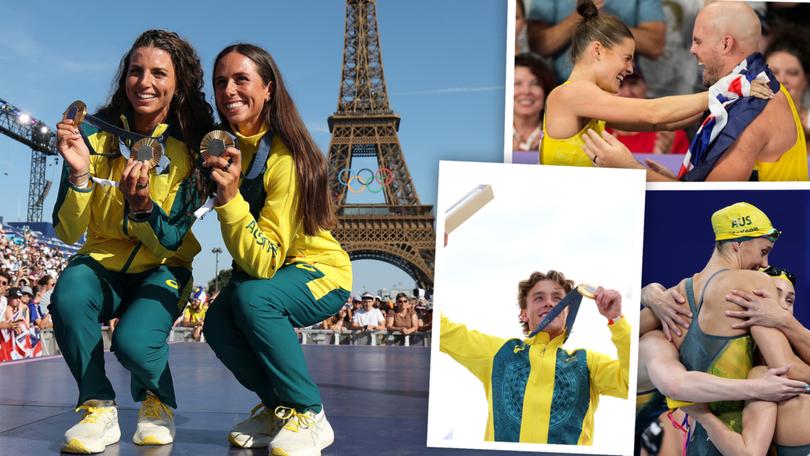Paris Olympics 2024: Australia is celebrating its greatest-ever medal haul at an Olympics Games

It wasn’t a gold rush. It was an avalanche.
Australia’s greatest ever day at an Olympics. Four gold medals and the dreamy storylines of an Olympic optimist.
There were tales of frustration, steely nerves, sublime talent and overwhelming justice, West Australian Nina Kennedy’s pole vault triumph an elegant exclamation mark on a day of joyous celebration.
Sign up to The Nightly's newsletters.
Get the first look at the digital newspaper, curated daily stories and breaking headlines delivered to your inbox.
By continuing you agree to our Terms and Privacy Policy.Kennedy’s victory took the nation’s gold haul to 18, one more than Athens in 2004.
Australia is now ranked third on the leader board with 41 medals in total, including 12 silver and 11 bronze, and there are still four days of competition remaining and a scattering of live chances across cycling, boxing, water polo, track anf field.
WA played a pivotal role on day 12 with Kennedy, Matt Wearn in the sailing, cycling trio Sam Welsford, Conor Leahy and Oliver Bleddyn part of the victorious team pursuit that ended a drought that stretched back the Greek Games two decades ago.
WA, just like the nation, is punching a very good fight out of its weight division.
Kennedy’s stunning win was an emotional one as she held off long-time American rival Katie Moon to become the first Australian woman to win a field event at an Olympics.
Unlike last year’s world championship final, there would be no sharing of the gold.
Restricted in her lead up by stress fractures of the back, Kennedy has also had to fight against mental demons and a very public reach for gold that, in her own words, left her “vulnerable”.
A logjam in qualifying meant she was up against 18 other vaulters, an earlier than normal start to competition that lasted five hours and included an equipment malfunction in the tense, dying moments.
Kennedy wobbled with her third vault, at 4.70m, when she misjudged her approach, hit the jump off balance and fell to her left.
Putting to rest the disappointment of an injury-plagued Tokyo Olympics that ended in her heat, Kennedy nailed every remaining jump, piling intensity into each vault, and finishing with a 4.90m clearance that ensured her victory.
Moon couldn’t clear 4.90m, passed to 4.95m in an all-eggs-in-basket roll at gold that fell short.
“I’m here, I’m a gold medallist, that is so sick,” Kennedy told Nine.
“I really had to go places I didn’t think I would have to go. I had to learn a lot about myself, the way I think, my past and I had to focus on me as a person and focusing on Nina the human has really brought out the best in the athlete.”
The cycling final was just as tense, as Great Britain trailed by only 0.2sec entering the final lap before their “finisher” Ethan Hayter slipped on his saddle and had to pull to the side, but was lucky not to wipe out his teammates Daniel Bigham, Charlie Tanfield and Oliver Wood.
The Australians were considered a medal chance but rocketed int favouritism with a 3:40.73 world record in their semifinal.
“A lot of people underestimated what we can do and we used that to our advantage here, and we kind of kept under the radar. We all knew we had it in us,” Welsford said.
Wearn was in the gold medal position entering the final race but had to wait two days to complete it. Even that final race was called off, with one leg left to complete, with Wearn charging for the finish line.
He sealed the defence of his gold medal in the men’s dinghy sailing classification with a victory in the resail.
“I feel like it’s been dangling in front of me for two days,” Wearn said. “There were a few expletives thrown around, it was pretty frustrating … especially the second time when they abandoned it … because we were so far round the track.
“But Rafa (Trujillo), my coach, did a fantastic job just to settle me down, get me ready to go for another one. We just had to keep executing our plan and that’s what we did … “Luckily it [the wind] filled back in, and we didn’t have to wait for another day.”
Australian skater Keegan Palmer defended his park skateboard title from Tokyo.
The 21-year-old, who is now based in San Diego, chose to skate in the green-and-gold because he felt he owed it to the country he grew up in.
“I can’t believe it. To be able to stand there with such a group of athletes in the village and to be able to talk to them for the whole week,” Palmer said.
“Then we just completed one of the biggest milestones in Australian sports history; it’s beautiful to be a part of it, it’s absolutely beautiful.”
Matt Denny broke a cruel streak of fourth-placed finishes to claim bronze in the men’s final, and Jemima Montag won her second bronze in Paris, this time finishing third in the mixed walking marathon relay with Rhydian Crowley.
The country’s 460 athletes is the third-largest contingent at a Games overseas.
Our dominant swimmers captured seven of those medals, while Jess Fox and sister Noemie combined for three in the whitewater events.
Saya Sakakibara and 14-year-old Arisa Trew both claimed the prize out of the action sports, while tennis pair Matt Ebden and John Peers and road cyclist Grace Brown also saluted.
The Athens success included gold medals for this year’s chef de mission Anna Meares, swimming legends Ian Thorpe and Grant Hackett, the Kookaburras and rowing’s famous oarsome foursome.
Pool stars Ariarne Titmus, Kaylee McKeown, Emma McKeon and Zac Stubblety-Cook brought home golds from Tokyo in 2021.
McKeon, Titmus, McKeown, Mollie O’Callaghan, Jess Fox and Wearn have already doubled up from those Games.
Australia’s women’s water polo and basketball teams are still alive in their tournaments, and track athlete Jess Hull, who last month became the world record holder in the non-Olympic women’s 2000m, is considered an outside medal chance in the 1500m.
Originally published on The Nightly
